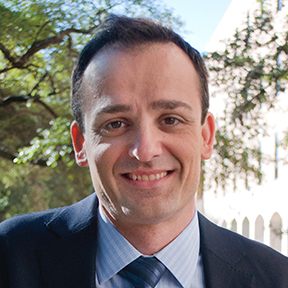
ABSTRACT: Statistics-based approaches to inference, estimation, and learning are ubiquitous in aerospace applications. This presentation will highlight some of our current research in this area and how it applies to challenging problems of interest to the aerospace engineering community.
In estimation problems we have access to data, typically measurements of some physical quantity, and we use them to infer the value of another related quantity which we call the state. Model-based estimators leverage a mathematical description of the measurement and invert this relation to predict the value of the state. For linear dynamic systems in the presence of linear measurements and Gaussian uncertainties, the optimal estimator is known analytically and its functional form is linear. This talk will focus on non-linear/non-Gaussian systems for which an analytical solution is not known and will describe our computational algorithms for model-based estimation as well as our work mixing physical models with data-driven inference.
The first application of our methodologies is Space Domain Awareness (SDA). The projected number of low Earth orbiting objects is expected to greatly increase in the future up to a level that adding more hardware and ground stations to track all of them at today’s rate is not an economically viable solution. Alternatively, tasking the current hardware to track that many more satellites results in a sharp reduction of the number of measurements associated with each space object; a situation that can lead to divergence or poor performance of linear estimators. While Earth orbits can be expressed with almost linear dynamics via the choice of appropriate coordinates, the same is not true in cislunar space, which can even exhibit chaotic behavior over long time scales. SDA with sparse measurements or in cislunar space are ideal applications to nonlinear estimators.
The second application of our methodologies is autonomous space systems. The key step to transition from automation to autonomy is the ability of the space system to adapt to its environment. Rather than having knowledge of all possible scenarios during the design process, an autonomous system is able to overcome certain classes of unplanned and unforeseen circumstances. We apply our methodologies to adaptive estimation to learn nonparametric uncertainties
BIO: Renato Zanetti joined the Department or Aerospace Engineering and Engineering Mechanics as an Assistant Professor in January 2017. Prior to joining UT, Renato worked for almost a decade in the private and government sectors.
From 2007 to 2013 Renato was an engineer at the Charles Stark Draper Laboratory. During this time he worked on every current and planned crewed NASA vehicle: the International Space Station (ISS), the Space Shuttle, and Orion. Renato was the lead relative navigation designer for Orbital Sciences Cygnus vehicle, which completed several successful cargo resupply missions to the ISS. From 2013 to 2017 Renato was an engineer at the NASA Johnson Space Center (JSC). During this time he served as one of the lead designers of the absolute navigation filter for Orion Exploration Flight Test 1 (EFT1), which successfully flew in December 2014. He was responsible for the design, coding, and testing of two navigation Computer Software Units (CSUs). During the EFT1 flight, he monitored the navigation telemetry from the engineering support room in Denver (Raptor). Prior to departing from NASA, Renato delivered the design and code of three CSUs for Orion’s next flight Artemis 1, which successfully completed its mission in 2022.
Renato is a Fellow of the American Astronautical Society (AAS) and an Associate Fellow of the American Institute of Aeronautics and Astronautics (AIAA). He is a former chair of the AIAA Astrodynamics Technical Committee and of the AAS Space-Flight Mechanics Technical Committee. Renato and the Orion GN&C group received the prestigious NASA Software of the year award in 2015. He is also the recipient of a NASA Technical Excellence Award for outstanding achievement in Orion navigation design, two NASA On the Spot awards, and several Team and Group Achievements Awards.
Date/Time:
Date(s) - Jan 13, 2023
11:00 am - 12:00 pm
Location:
8500 Boelter Hall Klug Memorial Room
580 Portola Plaza Los Angeles CA 90095
Map Unavailable
